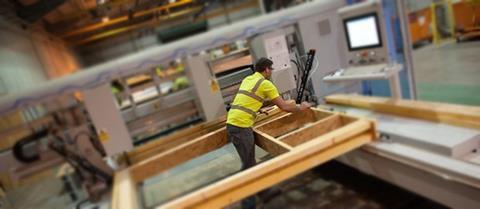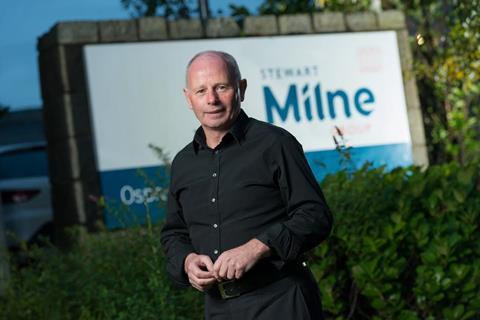The collapse of the well-known Scottish housebuilder has shocked many within the housing sector. As Daniel Gayne finds out, the firm’s balance sheets over the past few years provide some clues as to what went wrong

The collapse of the Stewart Milne Group earlier this month left many in the industry scratching their heads. How such a large housebuilder could find itself in administration? And is its failure a bad omen for the rest of the housing sector?
Building took a look at the firm’s accounts going back nearly a decade to find out how this once healthy firm fell into trouble and discovered a homegrown crisis of dwindling assets rooted in the slump in the oil-linked property market around Aberdeen and the firm’s hesitance to buy land during Covid.
The seeds of the crisis at Stewart Milne go back to the middle of the last decade in 2015, when the housebuilder was posting a profit of £5m and held £107m in net assets.
There was, however, a bad omen contained within that set of accounts, with the north-east of Scotland market – the firm’s spiritual home – noted to be “experiencing challenging conditions as a result of the low price of North Sea oil”. However the company said it remained “optimistic” about the Aberdeen market despite the challenges.
The following year (FY16) the firm attributed a drop in turnover to the “sustained reduction in the global oil price” impacting the north-east Scotland market. In FY17 it announced that it had decided to reduce investment in new sites in the region until demand recovered.
It was not until FY19 that troubles in the north-east were reflected on Stewart Milne’s balance sheet. A drop in the price of oil in the middle of the 2010s had hit the Aberdeen property market and the annual accounts accordingly read: “The housing market has remained challenging since the collapse in global oil and gas pricing in 2015 and the company has recorded losses in this division since that time.
“These losses generally stem not only from lower activity levels but also from the fact that land was acquired prior to 2015 and therefore held at a higher price than reflected in the current market. The group has therefore performed a full valuation of both our actively developed sites and also those held on the balance sheet but not under development.
“In order to reflect current market positions and the group’s strategy regarding future sites, an exceptional operating charge of £42.8m has been recorded in this period’s profit and loss account, principally related to asset impairment.”

From FY19 onwards, the firm was evidently in some trouble, posting negative net assets of between £48m and £61m in its final three sets of accounts.
There was some progress made during these years to correct course. Liabilities were reduced from 2019 onwards after a strategic review in 2020 and 2021 which saw it pivot toward becoming a dedicated housebuilder.
The timber system division was sold to James Donaldson Group in December 2021 for gross sale proceeds of £66.3m. Using the disposal proceeds, the business repaid £61m of its debt facility to the Bank of Scotland, reducing this facility to £114.3m.
According to a pro forma balance sheet presented with the FY21 accounts, had this sale been completed during the financial year, it would have just marginally returned the business to a positive net asset position of £41,000 (compared with the -£61.4m recorded in the statutory results).
Meanwhile, a group subsidiary, Countesswells Development Limited, which oversaw the development of a new town in Aberdeenshire, was placed into administration in November 2021, resulting in a reduction of £86m to the group’s net debt, according to the pro-forma balance sheet.
In April 2022, the company was put up for sale, but the process was paused eight months later citing “uncertainty in the market” after Liz Truss’ disastrous mini-Budget.
However, Stewart Milne’s efforts to reduce its liabilities, which were accompanied ultimately by a return to profit (FY22: £16.6m), did not keep pace with the decline in the value of its net assets.

Successive write-downs in the value of stock from the October 2019 accounts onwards took a cumulative £89m off the balance sheet. A final write-down of £16.3m in the FY22 accounts was part of a group of exceptional operating items totalling £41.4m.
According to the FY22 accounts, the business had also reduced its investment in land during Covid. The decline in the value of stock resulting from these two factors was the main cause for a decline in its total assets, which ultimately outpaced the progress made on reducing its liabilities.

In its final set of accounts (FY22), the business posted negative net current assets (-£32.6m) for the first time in the period examined by Housing Today (FY15 to FY22), meaning its liabilities falling within one year of the end of the financial year outweighed assets that the company could quickly make liquid.
Despite this, the directors of the company continued to believe in Stewart Milne Group Ltd as a going concern. After the year end (FY22), the company extended its credit facilities with Bank of Scotland through to 30 June 2024, providing the “necessary platform for the group to seek a new buyer” and allowing it to continue to acquire new sites to enable business growth.
Stewart Milne’s auditor, KPMG, drew attention to the fact that “requirements of the company’s bank facility include the completion of milestones in 2023 in this sale process”, which was restarted in May 2023.
The auditor also observed that “certain amounts owed by the company to related parties are forecast not to be called for repayment during the going concern assessment period”, noting that these two facts were material risks for the company.
Nonetheless, according to the accounts, the business’ directors believed – “based on their evaluation and inquiries” – that the sale of the company and its refinancing would be completed in 2023 and that “until then, amounts falling due by the group to related parties will not be called for repayment”.
But on January 8 this year, it was announced that Teneo had been appointed as administrators for the group. Teneo director Adele MacLeod said the “downturn in the UK housing market combined with an extensive sales process not resulting in any viable offers” had led to the decision.

At the time, the business’ founder, the eponymous Stewart Milne, came out with a statement which said that two bids had been submitted for the company, one of which he believed could have “delivered a comparable financial return to administration”.
However it appears that the bank, which accepted neither bid and withdrew its funding, had finally run out of patience.
When contacted by Building, Stewart Milne declined to comment.




























No comments yet